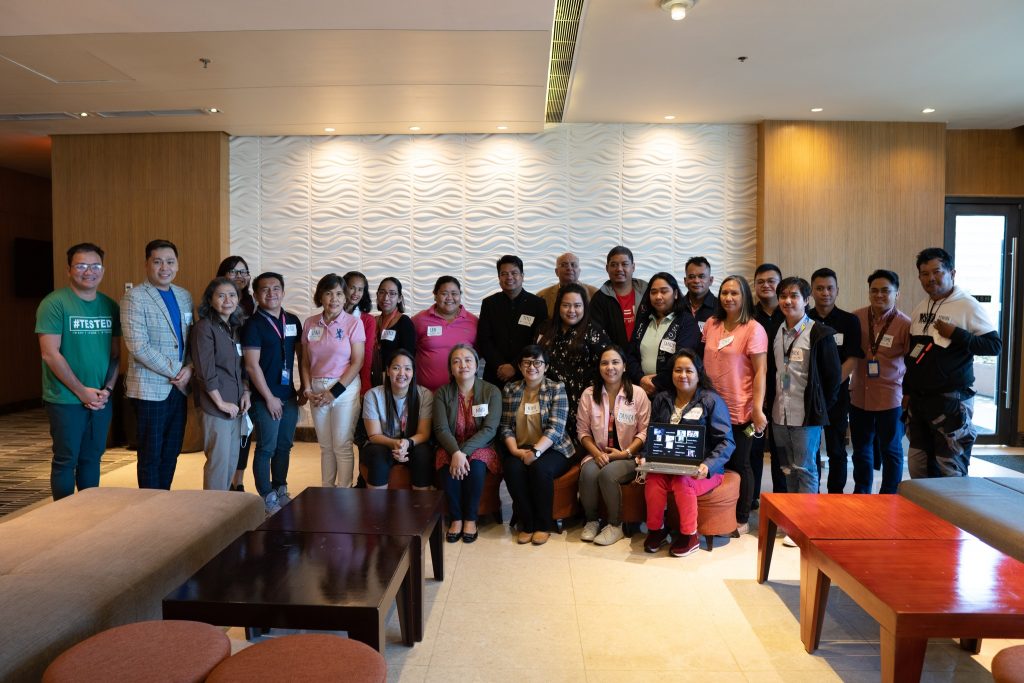
TBpeople PH attends The Philippine Acceleration Action Plan for TB (PAAP-TB) Consultation Meeting (February 11, 2023)
On February 11, 2023, TB Innovations sent an invitation to TBpeople Philippines Organization Inc. for a consultation meeting to promote PAAP-TB and gather feedback and pertinent recommendations from CSOs, CBOs, and other KAPs. They believe that our organization’s involvement in this project is key, acting as important conduits for enhancing participation and access to essential TB-related services.
As a result, the TBpeoplePH Core Team joins other Civil Society Organizations and Patient Support Groups in person and digitally through Zoom at the aforementioned consultation gathering. At the meeting, participants shared their thoughts and concerns, which were then addressed and resolved.
It is still unclear where certain groups acquire the money to finance themselves and what help they could receive from the government as a non-profit organization, despite the numerous accomplishments and recognitions that some organizations describe and show.

TB remains a significant burden, requiring a comprehensive approach that addresses social determinants of health and ensures equitable access to care. The global response to TB is inadequate, with disparities in diagnosis and treatment success due to a lack of comprehensive interventions. Addressing social, economic, and physical barriers is necessary to improve access to TB care and reduce disease incidence.
The Philippines continues to face chronic poverty and poor health outcomes, particularly among the lowest-income group. Addressing TB through a strategy informed by social determinants is critical for reducing health disparities and promoting health equity. Improving access to quality primary care and proactive clinical interventions is key.
To reduce the TB burden, strategies must address social determinants, which can account for up to 70% of health outcomes. The Department of Health’s 2023-2028 Health Sector Strategy prioritizes social determinants of health, recognizing their significant impact on the population’s health.
The DOH Disease Prevention and Control Bureau (DPCB) and its partners developed the Philippine Strategic TB Elimination Plan (PhilSTEP) in 2018 to support the global effort to end TB. DOH DPCB aims to reconfigure PhilSTEP into a multisectoral plan after 2023. The USAID’s TB Innovations, Health Systems Strengthening (TB IHSS) Project supports this reconfigured strategy through the Philippine Acceleration Action Plan for Tuberculosis (PAAP-TB). PAAP-TB serves as the basis for NCC agencies to integrate their TB elimination commitment to their mandates, policies, and work programs, with the goal of promoting health-risk reduction behavior and increasing demand for TB protection and care.
The PAAP-TB aims to address the nation’s TB epidemic by re-examining current programs and initiatives of TB-NCC member organizations. The high number of TB cases and the ineffectiveness of previous efforts prompted the use of a social determinant lens to address persistent diseases like TB. The incidence of TB in the Philippines exacerbates poverty and disparities experienced by the majority of the population.
The PAAP-TB serves as the focal point for addressing social determinants of health (SDH) and subgroups were formed to address specific variations of SDH. These subgroups facilitate collaboration among stakeholders and the exchange of information and best practices to increase the chances of concrete results. Core members coordinate the work and lead each subgroup. The subgroups are tasked with fostering collaboration between the TB-NCC and stakeholders, exchanging information on their themes, and implementing their subsections in the PAAP.
- Socioeconomic Development – Led by DSWD and composed of NEDA, DOTR, DSHUD, and DOLE, this subgroup aims to improve health outcomes for the low-income population by ensuring government services reach them. The subgroup will address gaps in social protection coverage for vulnerable groups and aim to facilitate social mobility among Filipinos living in poverty conditions that put them at risk of contracting infectious diseases like TB.
- Education, Public Information, and Community Engagement – Led by DepEd and CHED with TESDA and PIA as members, this subgroup aims to promote healthy behaviors through public information and social-behavioral change communication campaigns among the youth sector and at local levels. This subgroup will address the link between education and the health system’s skill mix demand, particularly in detecting, testing, treating, and monitoring infectious diseases like TB.
- Support for Service Delivery and Implementation – The local chief executives (LCEs) have major decision-making power and expanded duties due to the Mandanas-Garcia ruling. To improve the provincial health system, primary health care capabilities, touchpoints, and strategies must be strengthened and modernized. The DILG, DOH, and ULAP will lead the effort, with support from organizations such as AMHOP, PhilHealth, and FDA.
- Labor Protection – Protects workers from stigma and discrimination, including financial security from TB, and promotes healthy workplace policies for TB prevention and control.
- Other Stakeholders, i.e. Private Sector and Interest Groups – Establishes and maintains strategic community links with essential services and providers at the local level to enhance access and engagement with critical TB services across all sectors.
- Regional Coordinating Committee (RCC) equivalent – Rather than replicating the NCC as stated in the TB law, the role of the RCC can be used to resolve gaps between adaptive and consistent policy at the national level and execution at the sub-national and local levels.
By demonstrating our capabilities, TBpeoplePH presented our story of how we were able to start from nothing, become registered, work arduously and passionately, train, and become effective without receiving any funding from our own government to support our advocacy.
TBpeoplePH is prepared and eager to teach others so they may imitate us and share what we know. Successful, independent, and funded.
To listen and learn, all we need is a willing heart.
This participation is supported by Stop TB Partnership Challenge Facility for Civil Society (CFCS).
